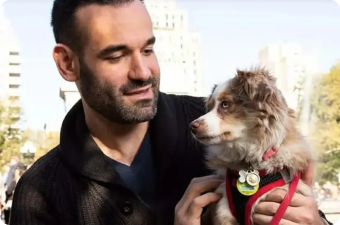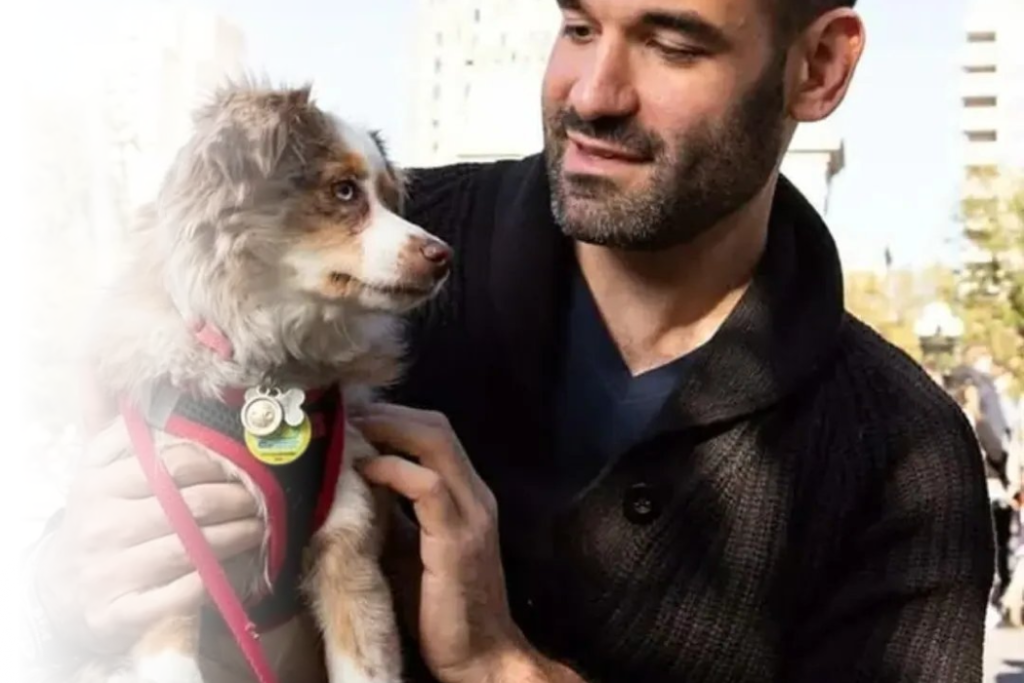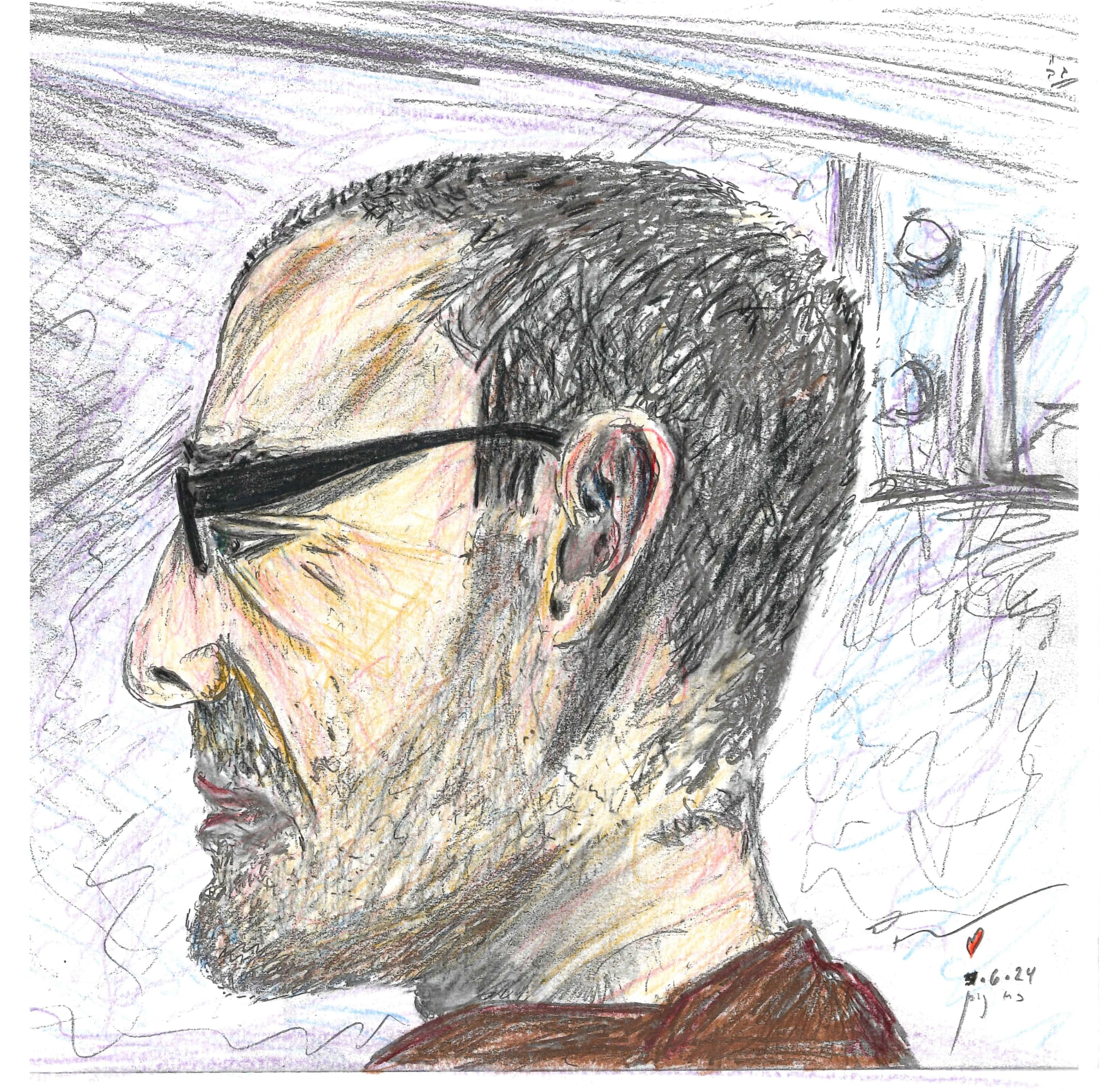“At 7, I was bound, abducted, and forced to have sex with other children, in a cinderblock room, much like I was kept at The Building,” says David (name changed).
He has said this twice, in the past week, the entire time we’ve known each other since he arrived from “The Building”, what the men here call Federal Detention Center (FDC) Miami, a highrise across the Federal Court in downtown Miami, with narrow slit windows and a dark gray concrete exterior with a decidedly medieval vibe, where I spent my first five days under the custody of the United States Federal Government July 4th weekend, 2019 — thinking blissfully it would be my last.
But I sense that while David has this story to tell, it is not the story keeping him stuck here, but a distraction from the one that is, a cover, an easy deflection, “Look over there, trauma!” says the part that doesn’t want to be seen, that doesn’t trust.
David, despite the similar childhood trauma as our last friend, is not here on a sex offense. (Editors note: He was but Ari made it a policy to not look into people’s charges while “inside”. ‘David’ is serving 4 years for downloading images and videos of abuse.)
“The judge gave me a lower sentence,” he explains, “because I have complex PTSD. I witnessed my son commit suicide.”
This is a topic that rings deeply in my heart, having lost a child albeit in a different way, and more so having battled such thoughts for years — though no longer, thankfully.
David and his first wife had adopted a boy from Russia, only to learn, “he had severe developmental delays and disabilities. His mother had been an addict.” David’s wife didn’t handle it well, pouring her love into their biological daughter (“We didn’t know we could have her, and the adoption process took much longer than we’d expected. It was a surprise.”) and leaving their son Alex (name changed, but like, really, there are only 5 Russian names and half of them are Alex) alone to cry and scream in his room. His wife wanted to send him back to Russia. David wanted a divorce.
“We achieved a lot of milestones nobody expected, he graduated High School. It took seven years, but we got him through it. He had a job. He was living independently.”
“But then he called, ‘Dad, it’s my time.’ I knew what that meant. He had struggled for years. I asked him where he was. He wouldn’t tell me. But my wife,” David remarried and had another daughter, “she figured it out and called the police and I kept him on the line, trying to delay him.”
He pauses momentarily, but eternally.
“He says, ‘Did you call the cops?’ I said, ‘I’m on the phone with you, Alex. I’m talking to you.’ ‘Did you call the cops!?’ ‘I’m talking with you, Alex’ And I heard the police, and I heard a gunshot. And the police picked up the phone and told me…”
All this to explain why the judge gave him a shorter sentence on a white collar case where he fudged his collateral on a commercial loan. But surely not really.
Men tell you stories for different reasons in prison. Some to feel or look important, some to avoid or deflect guilt, many to win a friend or share a laugh — to break the monotony of the gray walled eternity that is the monotonous repetition of prison life, a new story or joke or interesting tidbit is an oasis. But some stories seek more than they project, they are beacons from deep inside, beckoning for help, lost and treading upon a dark and ominous pool and hoping someone will recognize it and pull them to safety.
David, by the way, is a master at trivia, and he and John (name unchanged), the rookie children’s book author and my next-door bunkie in Glass House, who has an exceptional memory (a lime-coated cistern that doesn’t lose a drop, to borrow from Avot), and I exchange it. The #3-selling cookie by dollar in the USA… The building with the most floors in NYC is not the tallest…
At 14, David tells me the next night, his father took him to a therapist because David was upset his 9-year-old brother was being abused by their older step-sister. “You’re disrupting the family harmony,” was dad’s excuse for therapy. After two sessions, as David began to warm up to the therapist and feel trust, the father was done with therapy — which I suppose he thought would be a quick patch for a son with a leaky mouth.
“There is a part of you, David, that needs to tell these stories. You’ve told me about the abuse you’ve experienced, your brother, your father not validating your feelings and concerns — the opposite, in fact. But, we’ve just met, and people tell me things, people open up, but normally not within a week. There is a part of you with a deep need to unburden himself of these stories. I know about the 7 year old… but how old would you say this part is?”
“Fifteen.”
“Fifteen. So right after the therapist. And what is this fifteen year old trying to accomplish?”
“I think… I think I’m trying to organize and… ” He goes on, explaining his theory on his sharing.
“Ok, so that’s another part. That’s not the 15 year old’s voice. That’s a different voice. The Analyst, we’ll call him.
The Analyst jumps in in our conversations whenever we try to get to know one of these younger parts and deflects with his theories.”
“Yeah.”
“Can you ask the Analyst if he trusts you enough to let you talk with your own younger parts? If he’s willing to go sit in a waiting room for a few minutes and let them speak?”
“He is afraid.”
“That’s reasonable. Can you ask if he’s willing to sit just outside the waiting room and observe and wait to analyze until the end?”
“He says OK.”
“Ok, so thank him for being brave and letting these other parts have some space to speak.”
David nods.
“Ok, so let’s speak with the 15 year old.”
“He doesn’t trust you.”
“That’s fair. You can tell him that. Ask him, does he trust you?”
“He’s afraid I’ll screw things up. Like I always do.”
“Is that him saying that or you?”
“Him. He’s sarcastic.”
“Well, he’s 15. That’s normal. What is he afraid you’ll screw up?”
“That I’ll make a mess. That everything will go to shit.”
“He’s trying to hold everything together. To keep me from messing up.”
“Ok. Those are noble goals, but that’s a lot for a 15-year-old to handle.”
“I have screwed up. I’ve been hospitalized. I’ve hurt myself.”
“Cutting?”
“Yeah… but not anymore. Not for a long time.”
“Can you invite the 15 year old into the future? To now? Can you show him you have a successful daughter? A healthy and brilliant son? A wife who loves you? Friends here and outside who help you? How you wrote and sold a movie to a studio?”
“Yeah,”
“And what does he say to that?”
“He’s cynical.”
“That’s fair. Ask him, what would he like to be doing if he didn’t feel the need to hold everything together?”
“Nothing.”
“Really?”
“Yeah, just having fun. Just being a kid and doing nothing.”
“Can you ask him to try that out for a day and let you parent yourself as you were able to parent your son and daughter?”
“He says he’ll give a shot.”
“That’s very brave. Tell him that. Tell him you appreciate it, and to have fun doing nothing.”
The next day, David tells me he slept through the night. The first time in weeks he hasn’t woken to nightmares of losing his child. The 15-year-old let down his vigilance.
A couple days later, “I want to thank you for what you did for me.”
“No more nightmares? 15-year old enjoying doing nothing?”
“Yep.”
“That’s awesome. And now, the good thing is you know how to do this yourself, and you know that you can, so as you relax other parts may come up and want to talk, and you’ll know how to take care of them and help them heal.”
“Yeah,” he says with a smile.
We can never really know why G-d puts us in a place, though there are moments we get a clue, a glimmer of profound light, that we have done something we were meant to do, been there for someone at the right time, transformed our darkness and weakness into strength, so that we could lift ourselves up and then, having the empathy and understanding from our own experience, help others do the same.
I think back to an early lesson in this spiritual journey, where having lost so much that was dear to me through my own toxic reactions and spirals into even darker places, I knew it was time to confront these poisonous thoughts inside me. It is the lesson of the enemy’s donkey. When you come across your enemy’s donkey, fallen under its burden and the donkey didn’t offend you, his owner did! The Sages explain, that in doing so, you will see that you have no enemy, only a fellow human crushed under a burden he cannot lift alone.
This is an uplifting message (literally!), but as you go deeper into the journey you realize that not only do you not have a man who is an enemy, but there are no other men. The people you see, the energy you find, is a mirror of the world you inhabit. If you choose to see an enemy, you will see an enemy. If you decide to see a brother, you will see a brother. The power we have is to choose our perspective.
Viktor Frankl is correct, our last remaining freedom is the freedom to choose our reaction. But that is often misunderstood. The true freedom is to choose our reaction *before* the interaction, before we meet. The true freedom is resolving to see the humanity inside everyone. And once you can do that for someone else, you can do it for yourself. This is the lesson of Leviticus, “Love your neighbor as yourself.”
It is not easy — freedom comes from confronting our mistakes, weaknesses, moments of doubt and fear. It requires practice and discipline, physical and mental strength to maintain our focus, resolve, and routine. It requires tremendous bravery to jump into the river, even to follow others, to trust them, to trust our Selves. To know that, like David, we will be OK, we will be able to handle what comes our way, by ourselves or with the strength to ask for help.
There are many men here who do not yet have that bravery. They say they are inside due to “stupidity” of the system… not themselves. Their weakness exudes from their core, and drips upon their bodies and words. You can see it, feel it, sense it from across the room, from across the planet. Weakness, however, has a cure, and that is faith.
But what is faith? It seems so effervescent, so fleeting. A reading of Psalms or the story of King David (name not changed, no relation… but maybe!) shows an almost bi-polar thrashing, doubt, fear, lamentations, dancing before the Ark of the Covenant, debased and degraded in ways recorded before the world, exaltation and humiliation days apart, but deep, deep inside an eternal, relentless flame. Anyone who has found themselves in that deepest, darkest place, where all seems lost, where everything feels futile, has felt that flame.
The Torah is a law book, not a mere collection of homilies, because freedom requires work, constant, consistent, ongoing, ever-increasing work to maintain. There are ceremonies and holidays and ways of dressing and eating and interacting that keep us mindful of that flame — the Soul, the Self, the Spirit… the spark of G-d inside others, inside us. These are not ancient rituals, but timeless practices, active meditations.
Weakness is not a character trait, it is a side effect of losing, or never being gifted these rituals. In Judaism, we call a man unfamiliar with these laws, a “Kidnapped child” — taken from those who could teach him the right way.
Prison is full of men whose childhoods were kidnapped by violence, isolation, deprivation of a parent. It is arguably a perpetuation of that kidnapping.
Instead, it could be a bootcamp of emotional, physical, and spiritual strength, a place of love, a place greeting men and reminded them of that spark inside, helping them fan it into a fantastic flame.
“Sweet is the sleep of a laboring man,” King Solomon wrote (Kohelet 5:11)
David “did the work” and slept. And lest you think his interaction with me was some fast fix, he has been on such a journey of introspection for dozens of years, so that at age 58 he was able in that moment to ask those questions, to plunge into that cold and scary darkness. He brought himself to the pool, he allowed himself to jump in. These are brave acts that come from years of difficult decisions and hard work. I could do nothing to strengthen him, only to show him he already had the strength he was seeking. I did nothing to remove his trauma, only to help him see he no longer needed to hold it so close.
“It takes time to become anything worth becoming,” says Rabbi Sacks. (P.344)
Prison is not the men inside, it is the men inside the men inside.
Through telling these stories and helping them tell their own, we can redeem them.
In doing so, we can redeem ourselves.
===============
Group message. Draft 1.0. You may share this message.


